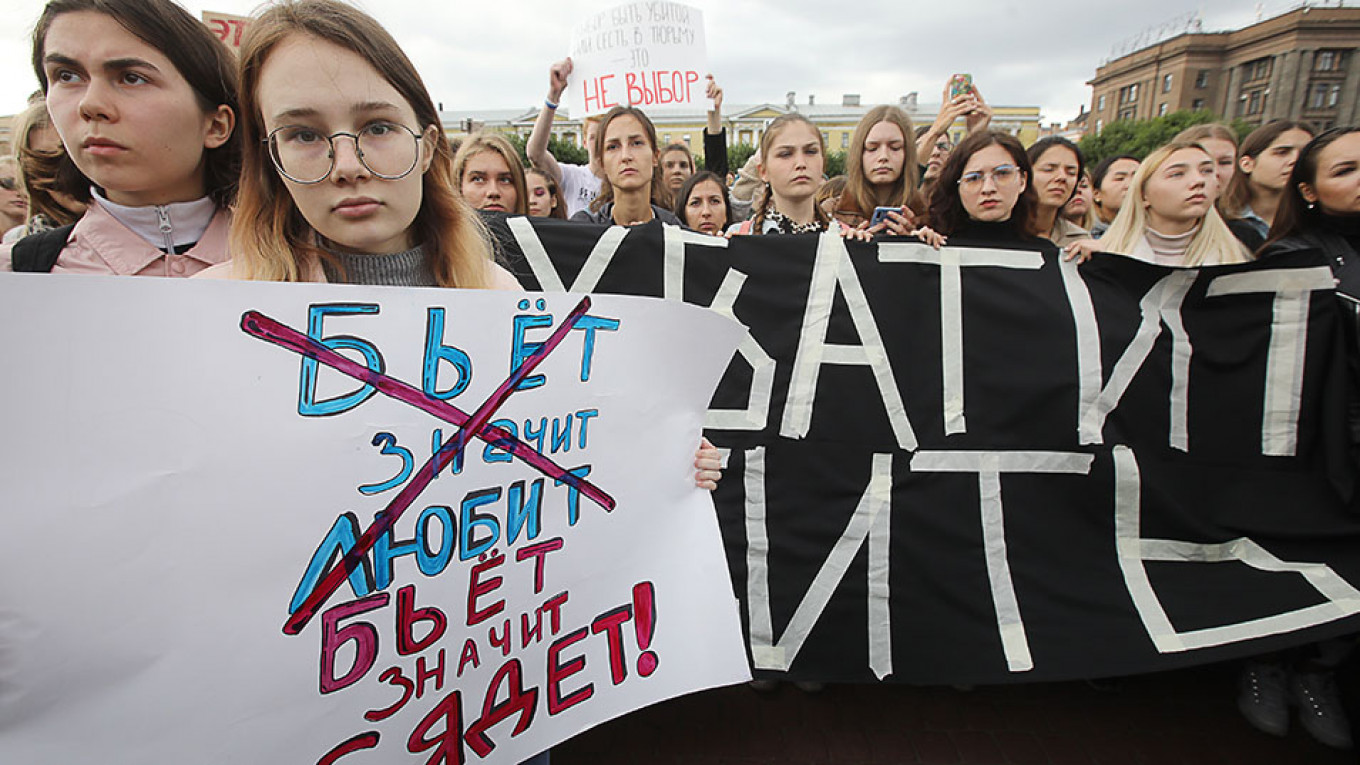In December 2017, Margarita Gracheva’s husband drove her into a forest in the Moscow region and chopped off her hands with an axe. Two years later, police pulled a history professor out of a St. Petersburg canal with a backpack containing the severed arms of his girlfriend, Anastasia Yeshchenko.
These are the most shocking of the horror stories to have come out of Russia since it scrapped criminal punishments for first-time domestic abuse offenses in February 2017. But in a country where the UN estimated in 2010 that a woman dies every 40 minutes at the hands of a man, and an old saying goes “If he beats you he loves you,” the tide of opinion is turning.
Russian lawmakers and activists are now working to pass a law that would re-criminalize domestic abuse — but conservative pushback and legislative hurdles risk stopping progress before it starts.
“Domestic violence in Russia is still, more frequently than not, viewed as a private, ‘family’ matter,” Yulia Gorbunova, a senior researcher at Human Rights Watch, told The Moscow Times. “Serious gaps in Russia’s laws, the lack of protection orders and inadequate police and judicial responses leave women who face even severe physical violence with little or no protection.”
This culture reaches all the way to the top. Last month, the Justice Ministry told Europe’s human rights court that domestic violence’s impact on Russian women is “quite exaggerated.”
As a result, State Duma lawmaker Oksana Pushkina says, official figures are skewed — meaning it’s likely much more prevalent than the numbers suggest.
“The fact is that domestic beatings are the most hidden type of crime, and because of their decriminalization it has become even more difficult to identify such cases,” she told The Moscow Times.
Public outrage over the recent gruesome events hints at a shift in society.
Gracheva’s case sparked nationwide shock, and an online petition addressed to the Russian government expressing outrage that Yeshchenko’s murderer had kept his job despite repeated accusations of harassment collected over 60,000 signatures.
Another high-profile case concerning Krestina, Angelina and Maria Khachaturyan — three sisters accused of murdering their father after he subjected them to years of physical and sexual abuse — sparked pockets of protest throughout the summer.
The work of activists, NGOs and other women’s rights groups has been a major force in shifting people’s thinking about domestic violence, Gorbunova said.
In October, State Duma lawmakers introduced a draft bill to overturn the 2017 law and re-criminalize first-time domestic abuse. Spearheaded by Pushkina, the law focuses on preventing abuse before it happens. It also contains provisions for women to obtain restraining orders, a first for Russia.
“It will include not only procedures for law enforcement agencies to identify and combat offenses, but also for coordinating projects and monitoring in the field of domestic violence prevention,” Pushkina said.
But when the upper-house Federation Council published the bill’s text last week, its co-authors were surprised by how much its language differed from what they had recommended.
“I am in total horror,” Alyona Popova, a women’s rights advocate and one of the bill’s co-authors, told The Moscow Times after it was published. She criticized the law for stating that its purpose is to ‘save the family’ rather than ‘protect the victim,’ and for aiming to promote reconciliation between parties.
“We constantly see examples of when, after reconciliation, the abuser kills the victim,” she said. “The very idea of ‘promoting reconciliation’ says to victims: ‘You fool, you’re to blame, why don’t you want to put up with it?’”
The Federation Council bill’s definition of domestic violence is “very vague,” said political scientist Yekaterina Schulmann. In addition, its provisions for restraining orders don’t contain specific details on how far the aggressor should stay away from the victim.
“There is no concept of punishment, which is something we hoped would finally appear in our legal code,” she added.
The Federation Council will field an open discussion on the bill through Dec. 15, allowing legislators, human rights groups and other civil society groups to request changes. Popova and the rest of the bill’s co-authors said they plan to push for it to be restored to its original form.
“Sodom and Gomorrah”
The bill has been a thorn in the side of conservative and radical Orthodox Christian groups since it was first introduced. Patriarch Kirill, the leader of the influential Russian Orthodox Church, has spoken out against the law, calling it an “intrusion of strangers into family life.”
At a small protest in a Moscow park last month, red flags bearing the image of a medieval Russian warrior billowed over speakers’ heads as they decried the bill. Organizers handed out pamphlets outlining their take on what will happen if the law passes, starting with Russia “recognizing 58 genders” and ending with the country “turning into Sodom and Gomorrah and dying, just like Europe.”
Anna Sadriyeva, the executive director of the Russian Association of Parental Committees and Communities (ARKS), said she attended the protest to rally against what she calls a “destructive, juvenile, anti-family law.”
“We don’t believe that domestic violence is a ‘traditional value’,” she told The Moscow Times as her young daughter waited nearby.
The group that organized this protest, Sorok Sorokov, was one of more than 180 organizations to sign an open letter to President Vladimir Putin asking him to block the bill. Pushkina recently told police about “extremist” threats she and the other co-authors have received from the group.
Gorbunova says the mindset of such groups is part of a larger trend in Russian politics that paints efforts to prevent and punish domestic violence as an assault on traditional family values.
Even so, Schulmann believes that estimations of the extent to which the Church and conservative groups will be able to block the new law might be overestimated.
“There are some limits to the Church’s lobbying power,” Schulmann said. “For example, in recent years, the Moscow Patriarchate has wanted to remove abortions from compulsory health insurance, but the government and United Russia do not support this, so nothing has happened.”
Uncertain future
As it stands, neither the law’s supporters nor its opponents are satisfied.
“We are protesting this law because it widens the understanding of violence. It criminalizes parents’ disciplinary actions toward their children. It criminalizes marital trust, it attacks our constitution and it attacks the presumption of innocent until guilty,” said conservative group leader Sadriyeva.
For activist Popova, however, it’s essential for Russia to adopt a domestic violence law with real power.
“How many more deaths are needed for lawmakers to understand that the law must not be a formality, but something that works toward the protection of victims?” she said.
A Message from The Moscow Times:
Dear readers,
We are facing unprecedented challenges. Russia's Prosecutor General's Office has designated The Moscow Times as an "undesirable" organization, criminalizing our work and putting our staff at risk of prosecution. This follows our earlier unjust labeling as a "foreign agent."
These actions are direct attempts to silence independent journalism in Russia. The authorities claim our work "discredits the decisions of the Russian leadership." We see things differently: we strive to provide accurate, unbiased reporting on Russia.
We, the journalists of The Moscow Times, refuse to be silenced. But to continue our work, we need your help.
Your support, no matter how small, makes a world of difference. If you can, please support us monthly starting from just $2. It's quick to set up, and every contribution makes a significant impact.
By supporting The Moscow Times, you're defending open, independent journalism in the face of repression. Thank you for standing with us.
Remind me later.







